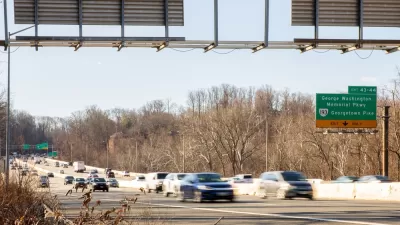Americans are driving more, again. Streetsblog dares to challenges the Federal Highway Administration on whether that's data worth celebrating.
"This June, Americans drove 8.7 billion more miles than last June, according to [the Federal Highway Administration], a 3.5 percent increase. Total mileage in 2015 is on pace for a new high — finally 'beating the previous record' of 1.5 trillion vehicle miles set 2007," according to an article by Angie Schmitt.
Schmitt's coverage reacts with some shock to the barely contained "glee" implied in the FHWA's reporting of the statistics via press release on August 20. Schmitt's opinion on what the trend of increased driving really means: "more traffic overwhelming city streets, slowing down buses, and spewing pollutants into the air."
Schmitt's concern, however, is that the FHWA’s press release reads like "the explicit goal of American transportation policy is simply to double traffic mileage again by 2050." That assumption, precedes an appeal for "increased transportation investment" in the press release.
So the question is: How should the FHWA, and other federal transportation agencies, frame the news that Americans are driving more and farther than ever before?
FULL STORY: FHWA Gleefully Reports That Driving Is Rising Again

Alabama: Trump Terminates Settlements for Black Communities Harmed By Raw Sewage
Trump deemed the landmark civil rights agreement “illegal DEI and environmental justice policy.”

Planetizen Federal Action Tracker
A weekly monitor of how Trump’s orders and actions are impacting planners and planning in America.

The 120 Year Old Tiny Home Villages That Sheltered San Francisco’s Earthquake Refugees
More than a century ago, San Francisco mobilized to house thousands of residents displaced by the 1906 earthquake. Could their strategy offer a model for the present?

In Both Crashes and Crime, Public Transportation is Far Safer than Driving
Contrary to popular assumptions, public transportation has far lower crash and crime rates than automobile travel. For safer communities, improve and encourage transit travel.

Report: Zoning Reforms Should Complement Nashville’s Ambitious Transit Plan
Without reform, restrictive zoning codes will limit the impact of the city’s planned transit expansion and could exclude some of the residents who depend on transit the most.

Judge Orders Release of Frozen IRA, IIJA Funding
The decision is a victory for environmental groups who charged that freezing funds for critical infrastructure and disaster response programs caused “real and irreparable harm” to communities.
Urban Design for Planners 1: Software Tools
This six-course series explores essential urban design concepts using open source software and equips planners with the tools they need to participate fully in the urban design process.
Planning for Universal Design
Learn the tools for implementing Universal Design in planning regulations.
Clanton & Associates, Inc.
Jessamine County Fiscal Court
Institute for Housing and Urban Development Studies (IHS)
City of Grandview
Harvard GSD Executive Education
Toledo-Lucas County Plan Commissions
Salt Lake City
NYU Wagner Graduate School of Public Service





























